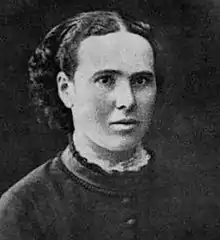Frances Hoggan
Frances Elizabeth Hoggan (née Morgan; 20 December 1843 – 5 February 1927)[1] was a Welsh doctor and the first British woman to receive a doctorate in medicine from any university in Europe. She was also a pioneering medical practitioner, researcher and social reformer – and the first female doctor to be registered in Wales.[2] She and her husband opened the first husband-and-wife medical practice in Britain.
Frances Hoggan | |
|---|---|
 | |
| Born | Frances Morgan 20 December 1843 Brecon, Wales |
| Died | 5 February 1927 (aged 83) Brighton, Sussex |
| Citizenship | British |
| Occupation | Physician |
Early life and education
Frances Hoggan was born in Brecon, Wales, where her father, Richard Morgan, was a curate. She was brought up and educated at Cowbridge in Glamorgan and later at Windsor. During her teens, she gave birth to an illegitimate daughter, who was brought up with her mother and passed off as Frances' sister.[3] She went on to study at Paris and Düsseldorf.
Upon the exclusion of women by the Council of the Worshipful Society of Apothecaries from its professional exams in 1867, Morgan sought her medical education at the University of Zurich, whence Nadezhda Suslova, Russia's first woman physician, had received her degree in December 1867. There, Morgan completed the medical course in three years rather than the expected five, and in March 1870, became only the second woman to gain an MD (with a thesis on progressive muscular atrophy) at Zürich University.[4] Afterwards, at a clinic in Vienna she undertook study on operative midwifery and became a pupil of surgeon Gustav Braun.[5]
She obtained her medical doctorate from the University of Zurich in March 1870, completing the six-year course in three years, becoming the first British woman to obtain a European MD degree.[6]
Career
Following her graduation, Frances did post-graduate work at top medical schools in Vienna, Prague and Paris before returning to Britain. She spent several years as a medical practitioner working with Elizabeth Garrett Anderson at the New Hospital for Women in London. She also helped to found the National Health Society with Elizabeth Blackwell in 1871. Its purpose was to "promote health amongst all classes of the population."[7]
In 1874, she married Dr George Hoggan. She obtained her licence to practice in the UK from The King’s and Queen’s College of Physicians of Ireland in February 1877.
Together with her husband, she opened the first husband-and-wife general medical practice in the UK. They both wrote medical research papers over the next decade, some of which were co-authored.[8][9]
In 1882, she called for a publicly funded women's medical service for female patients in India. This helped pave the way for the Dufferin Fund.[10] In the same year she became medical superintendent at the North London Collegiate School, one of the first rigorously academic secondary schools for girls. She held this role for six years.
She wrote a paper, in 1884, called 'The Position of the Mother of the Family', using the latest understanding about conception and reproduction to argue that mothers should have more rights over their children.[11]
Frances' husband George became ill in 1885 and the couple moved to the south of France. George died of a cerebral tumour in 1891.
Hoggan became a campaigner and social reformer, and toured the United States lecturing. She had a particular interest in racial issues, and was a speaker at the Universal Race Congress in London in 1911.
Death and legacy
Frances died in 1927. Her cremated remains are buried, with her husband's, in Woking cemetery.[12]
The Learned Society of Wales awards the Frances Hoggan Medal to outstanding women connected with Wales in the areas of science, medicine, engineering, technology or mathematics.[13]
Selected works
- Education for Girls in Wales (1882)
- American Negro Women During Their First Fifty Years of Freedom (1913)
References
- The Transactions of the Honourable Society of Cymmrodorion. The Society. 2003. p. 170. ISBN 978-0-9541626-0-3.
- "Dr Frances Hoggan". Learned Society of Wales. Archived from the original on 2017-10-25. Retrieved 20 December 2016.
- BBC – Wales History – Mothers of Industry
- Elston
- Thomas, Onfel. Frances Elizabeth Hoggan. Newport: R. H. Johns Limited.
- Elston
- Wales, The Learned Society of. "Dr Frances Hoggan". The Learned Society of Wales. Retrieved 2020-06-10.
- WalesOnline (2017-03-01). "Wales' first female doctor never stopped fight for equal education". walesonline. Retrieved 2020-06-10.
- Hoggan, George; Hoggan, Frances Elizabeth (October 1881). "On the Comparative Anatomy of the Lymphatics of the Uterus". Journal of Anatomy and Physiology. 16 (Pt 1): 50–89. PMC 1310070. PMID 17231418.
- Hoggan, Frances (1882). Medical Women for India. Bristol: J.W. Arrowsmith.
- Bell, Susan G.; Offen, Karen M. (1983). Women, the Family, and Freedom: 1880-1950. Stanford University Press. ISBN 978-0-8047-1173-9.
- "Findagrave.com".
- Frances Hoggan Medal, LearnedSociety.wales, Retrieved 26 June 2017
Bibliography
- M. A. Elston, "Hoggan, Frances Elizabeth (1843–1927)", Oxford Dictionary of National Biography, Oxford University Press, 2004 accessed 4 May 2007
- McIntyre, N. "Britain's first medical marriage: Frances Morgan (1843–1927), George Hoggan (1837–1891) and the mysterious "Elsie"." Journal of Medical Biography, 12:2 (2004), 105–14. Publisher: Royal Society of Medicine. ISSN 0967-7720.